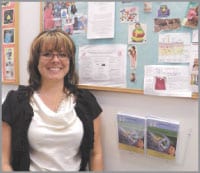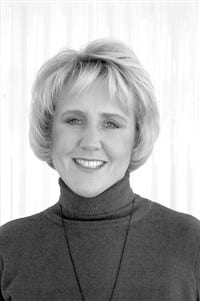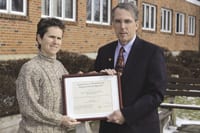Vested Interest Amherst Engineer Creates Pressure Vest for Children with Autism
The power of a hug can work wonders in relieving anxiety and stress. But many children with autism spectrum disorder are overly sensitive to touch and cannot tolerate the comforting gesture.
However, they do need something to quell their anxiety, which can result from their heightened response to sounds and sights most people don’t even notice.
And thanks to a groundbreaking new medical device, children with sensory processing disorder are being soothed and comforted by a lightweight, therapeutic vest that can be inflated to produce the exact amount of pressure the child needs at a given moment.
It’s called the Vayu Vest, and it has taken mechanical engineer Brian Mullen years of collaboration, research, and trial and error to create. “About 87{06cf2b9696b159f874511d23dbc893eb1ac83014175ed30550cfff22781411e5} of people with autism have sensory processing issues,” said Mullen. “They experience the world and respond to it differently than typical people.”
Tina Champagne agrees. “Children with autism are often oversensitive to touch, sounds, visual stimulation, and even temperature,” said the program director for the Center for Human Development’s Institute for Dynamic Living in Springfield.
The launch of the vest, which is named after a Hindu wind god, took place in May and was initially inspired by Champagne’s work as an occupational therapist at Cooley Dickinson Hospital in Northampton.
Champagne and Mullen have collaborated on the project for seven years, doing research and clinical trials to develop a product that not only helps children with autism, but may have other applications in mental health treatment.
Two years ago, Mullen and his business partner, Chris Leidel, started a business named Therapeutic Solutions to market the vest. The duo and their Amherst-based operation were recently named as finalists in the prestigious Mass Challenge competition in Boston that runs through the end of September. They are hoping to win a portion of the $1 million in cash awards, as well as generate interest in their product.
They have received help and won awards along the way for their work, which they are grateful for, and Mullen says their business is growing, thanks to support from the Western Mass. community. Their hope is to get the cost of the $2,000 device reimbursed by insurance companies. If they succeed, it will be the first medical device for autistic children paid for by insurance.
“This was and is all-consuming,” said Mullen. “It’s an incredibly important thing to do, and we are getting calls and e-mails from people thanking us.”
Research Project
The story of how the vest came to be begins when Mullen was a student at UMass Amherst. At the time, Champagne was working as group program director in Cooley Dickinson Hospital’s acute inpatient behavioral unit and was focused on collaboratively incorporating healing and nurturing interventions into clients’ treatment plans.
“I was working in conjunction with the state Department of Mental Health to find tools to help decrease the need for seclusion and restraints,” she said, explaining that people were sometimes put into mechanical restraints or injected with medication when their behavior spiraled out of control. “It was and continues to be an international initiative, and part of my job was to help staff learn new approaches and interventions that were safe and nurturing.”
One of the tools she incorporated was a weighted blanket, traditionally used to help calm people with autism when they became anxious. “The clients would wrap themselves in them,” she said. “The belief is that the pressure helps to decrease the autonomic nervous-system response of overarousal connected to anxiety.”
Research had been done in the field by Temple Grandin, an author, engineer, seven-time Emmy award winner, and well known woman with autism, who has spoken and written about autism for more than 20 years. Grandin, a professor of animal science at Colorado State Unversity, created a so-called “squeeze machine” for herself as well as for livestock waiting to be slaughtered.
Mullen began his documented collaboration with Champagne when he was in graduate school at UMass Amherst, and was looking for a project for his thesis. They had been introduced by his professor, Sundar Krishnamurty.
Mullen was fascinated by the subject, and soon became immersed in research himself, learning how weighted blankets and vests were being used with people with autism to help them self-soothe and regulate anxiety. “I saw a real need for this,” he said.
Champagne said other students had tried developing inflatable sleeping bags and vests, but the sounds they made as they inflated, and the feel of the fabrics used, upset children with autism.
And although Mullen was completely committed to his research project, he said it was a risky and unconventional topic for someone in the mechanical engineering program.
“I was taking a non-traditional path, the path less traveled,” he explained. “This was something different and new, and it appealed to me. I knew that what I was doing could have a large impact on people’s lives and I figured, ‘why not help when I have the opportunity?’”
Mullen said great progress has been in the field of autism research over the past seven years, “but the population is still drastically underserved. And it became compelling for me to help reduce the use of restraints and seclusion and come up with better solutions for people. After I saw and heard about this and was exposed to it, I felt I had to take action.”
Trial and Error
After earning his graduate degree, Mullen decided to continue to work toward a doctorate. In 2006, a feature story was written in the Boston Globe about the research he and Champagne were conducting. “We received a lot of very positive feedback from people in this country as well as on the international level,” he said.
About that time, he met with a parent who asked him to make a vest for her daughter to help curb her anxiety. Although he had interacted with others via e-mail, “it was very different when I had to sit across from a parent. It was very moving, and I decided to make sure that our research got to the people who could benefit from it.”
At that point, Mullen decided to start his own company with the goal of creating an inflatable vest that was portable, comfortable, and would allow pressure to be adjusted to an individual’s needs. He entered a 2006-07 UMass business-plan competition and lost in the finals.
“But I learned a lot from mentors and the judges who gave me a crash course in how to develop a business,” he said. He re-entered the 2007-08 competition and won the grand prize.
At that time, Leidel and Mullen joined forces. They had been in the same class as undergraduate students, but after graduation, Leidel had worked in an industrial setting before deciding to return to get a master’s degree in business administration.
He helped Mullen write an essay for an entrepreneurial competition, which won them a monetary award. In addition, they also received a grant from the National Collegiate Inventors and Innovators Alliance in Hadley. “It was a very important grant, as it helped us do some consulting work to further the idea and develop it to see if could actually become a business,” Mullen said.
The money also allowed them to work with Dielectrics in Chicopee, which specializes in medical devices. “They helped us to make a prototype and really took an interest in the product,” Mullen said.
After graduating in 2009, he and Leidel were able to raise seed funding for their business from local investors who were following their work.
Feedback has been integral to product development, and the duo continues to collaborate with local organizations. Champagne has found the vest works well for some children who have attention deficit disorder with hyperactivity, children with autism, and those who have suffered trauma.
However, she and Mullen stress that it is not for everyone. “Studies show that 75{06cf2b9696b159f874511d23dbc893eb1ac83014175ed30550cfff22781411e5} of individuals like deep pressure, but 25{06cf2b9696b159f874511d23dbc893eb1ac83014175ed30550cfff22781411e5} don’t,” Champagne said, citing results obtained from the first study they conducted and published, using the modality with adults aged 19 to 64 who had no mental health issues.
But for those who respond to pressure, the vest is groundbreaking, Champagne said. “And Brian and his staff have taken it on themselves to meet the highest possible standards for medical equipment.”
Today, vests have been donated by sponsors for use at the OTA Watertown Clinic, which is one of the largest occupational therapy facilities in the country, and also at River Street School in Windsor, Conn. and at the Center for Human Development, where it is used under Champagne’s direction. Mullen and Leidel are also renting out the vests on a individual basis.
The Vayu Vest was registered as an FDA Class I exempt medical device with the U.S. Food and and Drug Administration last fall, and Mullen and Leidel hope to get it reimbursed by insurance.
“We think we have a significantly better solution than anything that has been tried in the past to apply pressure on a personal level whenever and wherever it is needed. It’s our passion to get it to children who can benefit from it,” Mullen said.
So that they can be held and comforted in a way that is personalized, safe, discreet, and makes a lasting difference in their reaction to the world.




